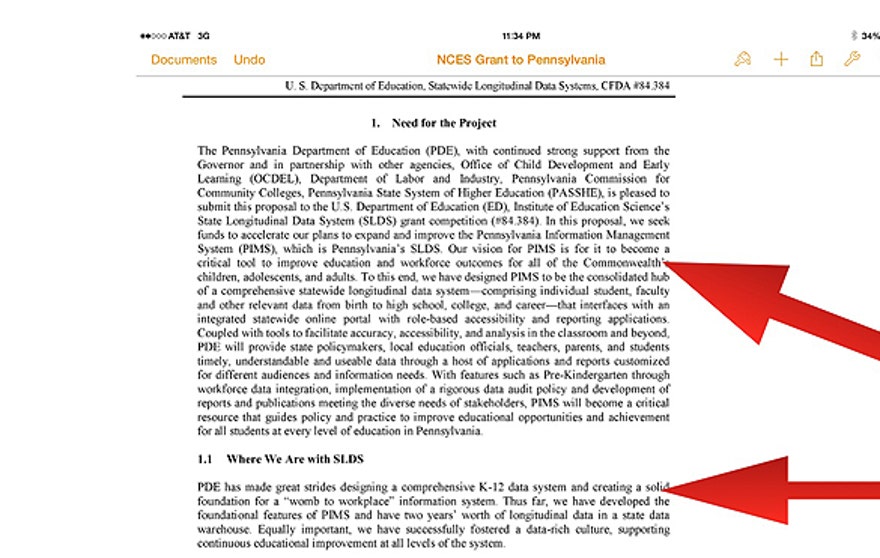12/7/2014

source

(AP)
A little-known aspect of Common Core should have students worried about what goes on the dreaded "permanent record," say critics of the national education standard.
Parents in Pennsylvania have written outgoing Gov. Tom Corbett to demand a moratorium on the collection of what they describe as sensitive and personal information on students, which they say is part of a federal database to track the development of every child. And education activists around the nation say it is part and parcel of the controversial campaign to impose a uniform, national standard for math and English.
“This follows them from the cradle to the grave,” said Tracy Ramey, of Pennsylvanians against Common Core. Her group, along with Pennsylvanians Restoring Education, recently wrote Corbett to demand the shutdown of the state’s Pennsylvania Information Management System (PIMS) in all 500 school districts.
“What’s alarming is what they are doing with the data,” Ramey said.
The process, set to play out throughout the country in what critics call a “womb to workplace” information system, was originally developed by the Department of Labor and contains information on every U.S. citizen under the age of 26. Most of the information on individuals is collected while K-12 students are in school, and includes names, grades and information such as personality traits, behavior patterns and even fingerprints. The state of Pennsylvania was one of the early adopters of the data mining and contributed to the framework for a nationwide program.
Both groups allege that any state entity as well as outside contractors can access personal information.
“This follows them from the Cradle to the Grave.”- Tracy Ramey, Pennsylvanians against Common Core
“The personally identifiable information includes information on every student’s personality, attitudes, values, beliefs, and disposition, a psychological profile called Interpersonal Skills Standards and anchors,” reads the letter sent to Corbett on Monday. “This data has been illegally obtained through deceptive means without the parents' knowledge or consent through screening, evaluations, testing, and surveys. These illegal methods of information gathering were actually fraudulently called ‘academic standards’ on the [Pennsylvania] Department of Education website portal.”
Anita Hoge, a member of Pennsylvanians Restoring Education, said local districts may have a need to collect some personal information, but a state or national database is a danger.
“There are two problems with sharing data beyond the local district,” she said. “First, parents are not aware that FERPA [Family Educational Rights and Privacy Act] regulations now allow their children's data (personally identifiable information) to be shared to outside third party vendors. And, this data is being collected and placed on a data system that is shared with the feds. This first level of data collection and sharing is a violation of privacy.”
“The second problem is that the data then becomes a ‘decision making model,’” she added. “This is where the violations of privacy are expanded for information to be used for ‘interventions.’ This is a civil rights violation.”
Pennsylvania Department of Education officials said the activist groups are misinformed.
“It’s riddled with inaccurate information,” Tim Eller, spokesman for the Pennsylvania Department of Education, said of the letter. “This has been an ongoing issue associated with Common Core, [and one] which Pennsylvania is not part of.”
“It’s possible that school districts are collecting data but not probable,” he said, adding that the DOE has no outside contracts either.
The department provided a list of “data elements” that go into the PIMS system, which include basic information like courses taken, but also information on truancy, infractions and disciplinary actions.
Eller adds that the school safety data does not include an individual students name and that such data is collected with the explicit purpose of ensuring a safe environment and not to call out the infractions of a particular student.
But Hoge said her group has proof their concerns are well-founded, in the form of a contract the state entered into with Statewide Longitudinal Data Systems (SLDS) such as the PIMS system.
“PDE has made great strides designing a comprehensive K-12 data system and creating a solid foundation for a ‘womb to workplace’ information system," reads a section from the grant contract, which Hoge's group obtained from the state Senate Education Committee. "Thus far, we have developed the foundational features of PIMS and have two years’ worth of longitudinal data in a state data warehouse.”
Eller stressed the group's misunderstanding of the system, telling FoxNews.com that the Department of Education is not participating in the womb to workplace database and that PIMS was put into place since 2007.
source

No comments:
Post a Comment